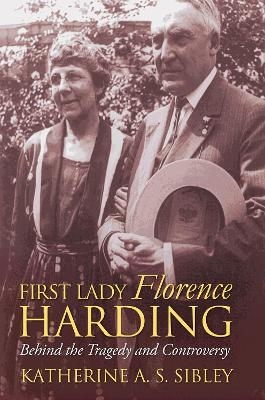
First Lady Florence Harding
Behind the Tragedy and Controversy
Seiten
2009
University Press of Kansas (Verlag)
978-0-7006-1649-7 (ISBN)
University Press of Kansas (Verlag)
978-0-7006-1649-7 (ISBN)
Florence Kling Harding has come down through history as one of our most scorned first ladies. This book offers a full treatment of Florence as first lady rather than as mere supporting actress in the Harding administration. It also describes how Mrs Harding supported racial equality, and maintained a lifelong interest in preventing animal cruelty.
Florence Kling Harding has come down through history as one of our most scorned first ladies. Victimized by caricatures and branded a shrew, she stands at the bottom of historians' polls, her reputation tarnished by her husband's scandals despite their joint popularity while in office. These depictions, argues Katherine Sibley, have prevented us today from seeing how innovative a first lady Florence Harding really was. This new look at Mrs. Harding restores humanity to an oft-maligned figure by examining her progressive causes, her celebrity, and her role in her husband's work. For if Eleanor Roosevelt is credited with shattering the first lady's ceremonial mold, it was Florence Harding who made the first cracks. Sibley's is the first book to offer a full treatment of Florence as first lady rather than as mere supporting actress in the Harding administration. Never shying from publicity, she made herself more available to the press than did her predecessors and opened the White House up to the public. And she took such a pioneering role in Warren Harding's campaign and presidency that many thought she outdid her husband as a politician. Turning to primary sources that others have overlooked, Sibley challenges the cliches about Florence's time in the national spotlight. She describes how Mrs. Harding supported racial equality, lobbied for better treatment for veterans and female prisoners, and maintained a lifelong interest in preventing animal cruelty. As adviser to her husband, she assisted with his speech-writing and consulted with the cabinet; she was also the first first lady to deliver spontaneous speeches while traveling with the president. At a personal level, Sibley examines in detail how Mrs. Harding responded to her husband's death, assessing why this tragedy struck Americans with such force even as national empathy proved so fleeting. She also offers a more nuanced description of the president's philandering, viewing Nan Britton's claims with skepticism while noting the effects on Florence of his dalliance with Carrie Phillips. Florence Harding bequeathed an activist legacy, and it is due to her example that aspiring presidential wives are expected to campaign with their husbands and be accessible to public and press. Florence Harding truly set the stage for those to follow; this book delivers the full and fair portrait that has long been her due.
Florence Kling Harding has come down through history as one of our most scorned first ladies. Victimized by caricatures and branded a shrew, she stands at the bottom of historians' polls, her reputation tarnished by her husband's scandals despite their joint popularity while in office. These depictions, argues Katherine Sibley, have prevented us today from seeing how innovative a first lady Florence Harding really was. This new look at Mrs. Harding restores humanity to an oft-maligned figure by examining her progressive causes, her celebrity, and her role in her husband's work. For if Eleanor Roosevelt is credited with shattering the first lady's ceremonial mold, it was Florence Harding who made the first cracks. Sibley's is the first book to offer a full treatment of Florence as first lady rather than as mere supporting actress in the Harding administration. Never shying from publicity, she made herself more available to the press than did her predecessors and opened the White House up to the public. And she took such a pioneering role in Warren Harding's campaign and presidency that many thought she outdid her husband as a politician. Turning to primary sources that others have overlooked, Sibley challenges the cliches about Florence's time in the national spotlight. She describes how Mrs. Harding supported racial equality, lobbied for better treatment for veterans and female prisoners, and maintained a lifelong interest in preventing animal cruelty. As adviser to her husband, she assisted with his speech-writing and consulted with the cabinet; she was also the first first lady to deliver spontaneous speeches while traveling with the president. At a personal level, Sibley examines in detail how Mrs. Harding responded to her husband's death, assessing why this tragedy struck Americans with such force even as national empathy proved so fleeting. She also offers a more nuanced description of the president's philandering, viewing Nan Britton's claims with skepticism while noting the effects on Florence of his dalliance with Carrie Phillips. Florence Harding bequeathed an activist legacy, and it is due to her example that aspiring presidential wives are expected to campaign with their husbands and be accessible to public and press. Florence Harding truly set the stage for those to follow; this book delivers the full and fair portrait that has long been her due.
Katherine A. S. Sibley is chair of the History Department at Saint Joseph's University in Philadelphia and author of Red Spies in America (see page 26).
| Reihe/Serie | Modern First Ladies |
|---|---|
| Zusatzinfo | 24 photographs |
| Verlagsort | Kansas |
| Sprache | englisch |
| Maße | 147 x 241 mm |
| Gewicht | 700 g |
| Themenwelt | Literatur ► Biografien / Erfahrungsberichte |
| Sachbuch/Ratgeber ► Geschichte / Politik | |
| Sozialwissenschaften ► Politik / Verwaltung | |
| ISBN-10 | 0-7006-1649-7 / 0700616497 |
| ISBN-13 | 978-0-7006-1649-7 / 9780700616497 |
| Zustand | Neuware |
| Haben Sie eine Frage zum Produkt? |
Mehr entdecken
aus dem Bereich
aus dem Bereich
Caspar David Friedrichs Reise durch die Zeiten
Buch | Hardcover (2023)
S. Fischer (Verlag)
CHF 34,95


